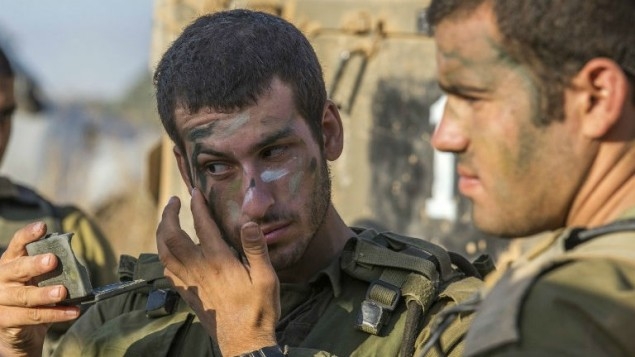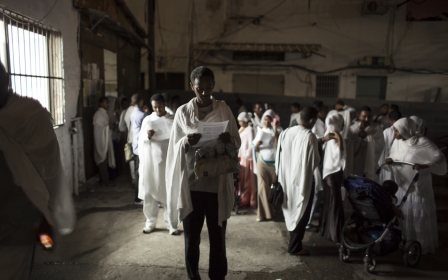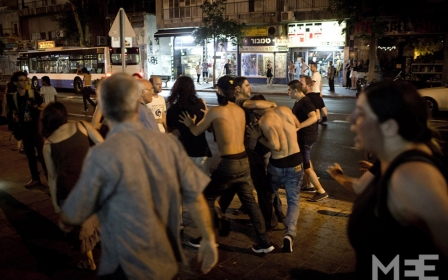The disturbing story from within

"If you're homosexual and know someone who knows a wanted person, Israel will make your life miserable. If you need emergency medical treatment in Israel, the West Bank or abroad - we will search for you. The state of Israel will allow you to die before we let you leave for treatment without giving information on your wanted cousin. If you interest unit 8200 and don’t have anything to do with any hostile activity, you’re [still] an objective."
Unit 8200, with which the ex-soldier who gave this testimony did his army service, is not just any unit in the Israeli army. Originally a unit responsible for collecting signal intelligence, it has become the largest unit in the Israeli army, and probably its most prestigious one. It is alleged to have capabilities to monitor every phone call or transmission or electronic data in any spot in the Middle East (and maybe beyond), to store this huge bulk of information and process it in an extremely sophisticated way so it can be used for precise military actions, from hitting a secret nuclear site in Syria to targeted killings in Gaza.
No wonder Unit 8200 has become the Mecca for many young Israelis who wish to have an interesting and challenging career in military service, without having to enlist in demanding and dangerous battlefield units. Unit 8200 - with the state of the art technology it had developed and continues to develop - has been the breeding ground for Israel’s high-tech industry. Its veterans have founded the most successful hi-tech Israeli firms (Check Point and ICQ among many others); so serving in Unit 8200 may be the key for a bright future. Many Israeli elites, who once gloried in sending their boys to combat units, prefer to see their sons and daughters serve in this "white collar" but prestigious unit.
Now these young men and women speak out for the first time. 43 Unit 8200 veterans signed a letter addressed to Prime Minister Benjamin Netanyahu and Chief of General Staff Benny Gantz, in which they declare their refusal "to take part in actions against Palestinians" and "to continue serving as tools in deepening the military control over the Occupied Territories."
Their testimonies, like the one cited above, do not say anything new to those familiar with the reality of the Palestinian Territories. Allegations that Israel is using sensitive personal information or health problems to coerce Palestinians to cooperate with the Shin Bet (General Security Service) have been documented on innumerous occasions. But this is the first time that such information is provided by the people who collect it, the young soldiers in Unit 8200.
Their testimonies do not refer to specific cases. Israeli military censorship would have prevented them from revealing the very sensitive information they know and are compelled to keep in silence. But they do tell a story; a story of systematic harassment of a whole people. "All Palestinians are exposed to non-stop monitoring without any legal protection," the testimony cited above continues. "Any Palestinian may be targeted and may suffer from sanctions such as the denial of permits, harassment, extortion, or even direct physical injury."
Another veteran recalled watching the film "The Lives of Others" which depicts life under the Stasi secret police in East Germany. "On the one hand, I felt solidarity with the victims," he said. "On the other hand, I realized that the job I had done during my military service was that of the oppressor." One of the veterans told that they learnt different ways of saying "gay" in Arabic in order to use these terms as tools for blackmail.
A few hundred Israeli soldiers, most of them from the reserves, refused to serve in the 1982 war in Lebanon, contributing to the delegitimisation of the war in the eyes of the Israeli public. Fewer refused to serve during the Second Intifada, but Dov Weisglass, an adviser to then Prime Minister Ariel Sharon, admitted in a newspaper interview that the accumulation of their protests pushed Sharon into his disengagement plan from Gaza in 2005. Will the letter signed by the Unit 8200 veterans, published today but initiated before Operation Defensive Edge, have the same effect?
Michael Sfard, a human rights lawyer - who served three weeks in military jail in 1998 after refusing to serve in the West Bank and who now represents the group of veterans - believes that their voices will be heard. Their social background, notes Sfard, will play a part. "The veterans of Unit 8200 constitute the elite class of today's Israel," he said. "Many high-ranking Israelis will open the newspapers today and will read what their children are doing in the army." Certainly not pleasant reading.
But according to Sfard, this is not only a sociological matter. The refuseniks in Lebanon or during the Second Intifada were mostly combat soldiers, so their point of view was limited; their testimonies about harassment and humiliation of Palestinians could have been described as localised incidents. The veterans of Unit 8200 are located in a different place. They can supply a view "from above" on the state of occupation, on its nature. "They are saying that in order to control another people, we have to do these things," commented Sfard, "There is no doubt that this is touching one of the last 'sacred cows' in Israeli society."
Yet Sfard himself admits that it is too early to say what actual effect these testimonies will have. When reservists testified how they had bitten Palestinians for no reason during the First Intifada in 1987, Israel was in shock. When news of the massacre in Sabra and Shatila broke out in 1982, hundreds of thousands of Israelis went down to the streets in protest. Up till now, a day after the testimonies of the "good guys" from Unit 8200 were published, no major Israeli politician has even bothered to comment on their disturbing stories. The new testimonies will certainly help to document the Israeli occupation. They have less chance of changing it.
Meron Rapoport is an Israeli journalist and writer, winner of the Napoli International Prize for Journalism for a inquiry about the stealing of olive trees from their Palestinian owners. He is ex-head of the News Department in Haaertz, and now an independent journalist.
The views expressed in this article belong to the author and do not necessarily reflect the editorial policy of Middle East Eye.
Photo credit: Israeli army soldiers camouflage their faces (AFP).
New MEE newsletter: Jerusalem Dispatch
Sign up to get the latest insights and analysis on Israel-Palestine, alongside Turkey Unpacked and other MEE newsletters
Middle East Eye delivers independent and unrivalled coverage and analysis of the Middle East, North Africa and beyond. To learn more about republishing this content and the associated fees, please fill out this form. More about MEE can be found here.





